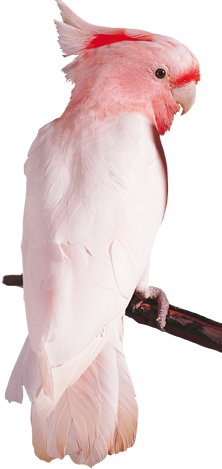Articles
The secrets to a good life…
We all know that the right balance of essential vitamins and minerals is an important part of keeping our birds in peak health.
Have you ever wondered about the specific function of certain nutrients?
All GOLDEN COB™ seed mixes have been specially formulated to provide your birds with an ideal combination of protein, fats, carbohydrates, vitamins, minerals and water to promote growth, normal development, reproduction and resistance to disease.
Here's a quick snapshot of how each of these important nutrients can help maintain your bird's health and wellbeing:
Protein
Proteins are made up of smaller molecules called amino acids and are essential for maintaining the general body condition, muscle tone and the growth of feathers. If a bird becomes deficient in certain types of amino acids, it may lose weight and become more susceptible to disease.
When choosing a diet for your birds it's important to remember that different plant proteins yield different balances of amino acids, so cage and aviary birds will require a mixture of seeds to ensure a balanced supply of amino acids.
Fats
Fats are an important part of a bird's diet for many reasons. Firstly, similar to carbohydrates, they are vital as a calorie source. Seeds vary widely in their fat content, from only four percent in millet to three percent in canary seed to 46 percent in grey striped sunflower seeds. These fats are in the form of oils.
Secondly, fats are necessary for the structure of the living cells that make up the bird's body. One such essential fatty acid is linoleic acid. This is a component of fats that cannot be made by the birds themselves and so must be given in their diet. The essential fatty acids are needed for the healthy functioning of cells and for hormone production.
Carbohydrates
Carbohydrate is the name given to sugary and starchy substances. Starch from the kernels of seeds and the glucose found in fruit or nectar is the most common source of carbohydrate for birds and is a major source of energy.
In birds, starch is broken down in the digestive system to form glucose. This is then absorbed in the small intestine and the glucose molecules are reassembled and stored in the liver as glycogen or used as a fuel to produce energy. The amount of carbohydrate in kernels varies between seeds from 19 percent for rapeseed to 67 percent in millets.
Vitamins
Like us, birds need a number of vitamins to stay healthy. Birds require vitamins A, D, E and K, and some members of the vitamin B family. Only some of the more unusual species of pet birds require vitamin C, such as the Red-Vented Bulbul from Asia. However, supplementary vitamin C may be beneficial in times of stress, reproduction, moulting or growth.
Water
Seed-eating birds get very little water from their food and therefore need a supply of fresh, clean drinking water at all times. Scientists at WALTHAM® have shown that the average budgerigar needs to drink 3ml to 5ml of water each day (although this will depend to some extent on the temperature and humidity).
A bird also produces water in its body as it metabolises carbohydrate and fat to produce energy. Water gained in these two ways must balance that lost through the skin and lungs by evaporation and in the bird's droppings.
For a pet bird to enjoy good health its diet must also contain:
Calcium
Calcium is essential for the development and growth of bones and muscles. It also aids in the proper functioning of the heart, muscles, blood and the nervous system. A lack of calcium will lead to brittle and soft bones, even deformity and inferior egg production. Some sources of calcium include cuttlefish bones and calcium supplements.
Iron
Iron is part of the haemoglobin in the red blood cells that carry the oxygen around the body and is therefore essential to the development and function of healthy blood. A lack of iron can lead to anaemia, debilitated transportation of oxygen from the lungs to the tissues, muscle weakness and poor operation of the whole body. A good source of iron is obtainable from nuts, green vegetables and soya beans.
Magnesium
Magnesium is valuable for the formation of bones and proper metabolism as well as activating a number of essential enzymes. A lack of magnesium can cause impaired bone formation, and the body to use carbohydrates and amino acids when it is not warranted. A rich source of magnesium is available in whole grains, vegetables, fruits, nuts and beans.
Manganese
This essential mineral is needed for the formation of healthy bones and blood, and for regulating the metabolism by activating various enzymes. A bird deficient in manganese can contract bone disease, anaemia, have a poor metabolism and exhibit general weakness. A good source of manganese can be found in green vegetables, whole grains and nuts.
Phosphorus
Phosphorus is fundamental in all of the major metabolic functions, the growth and regeneration of cells, digestion of vitamins B2 and B3 and combines with calcium to build strong bones. A lack of phosphorus leads to poor bone growth and disease, the inability of tissues to heal properly and body sores. This can be corrected by feeding whole grains, nuts, eggs (cooked), seeds and vegetables.
Sodium
Sodium is needed to regulate the body fluids and to help keep the alkali acid in balance. Either too much or not enough sodium in a bird's diet will cause it to become dehydrated as well as upset the alkali acid ratio. Feeding root vegetables and cooked eggs will soon correct this.
Zinc
Zinc is necessary for proper metabolism and is also a component of insulin. A lack of zinc will quickly lead to a poor metabolism, a decrease in insulin production, and possible diabetes. This can be easily corrected by feeding vegetables, wheat germ and nuts.
